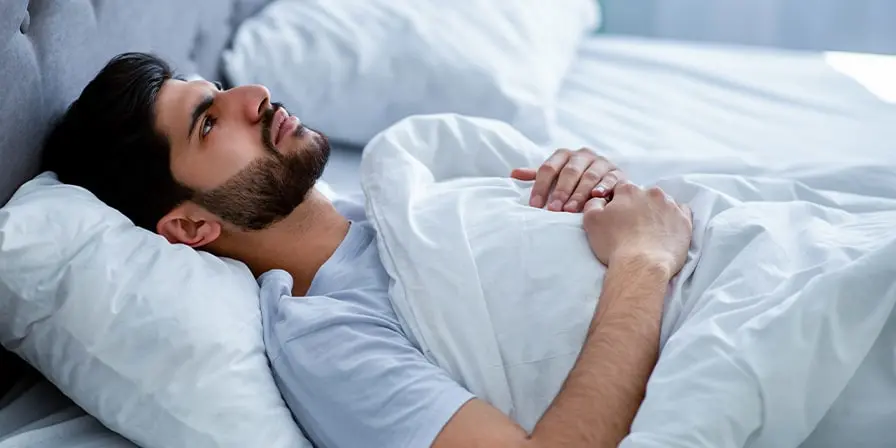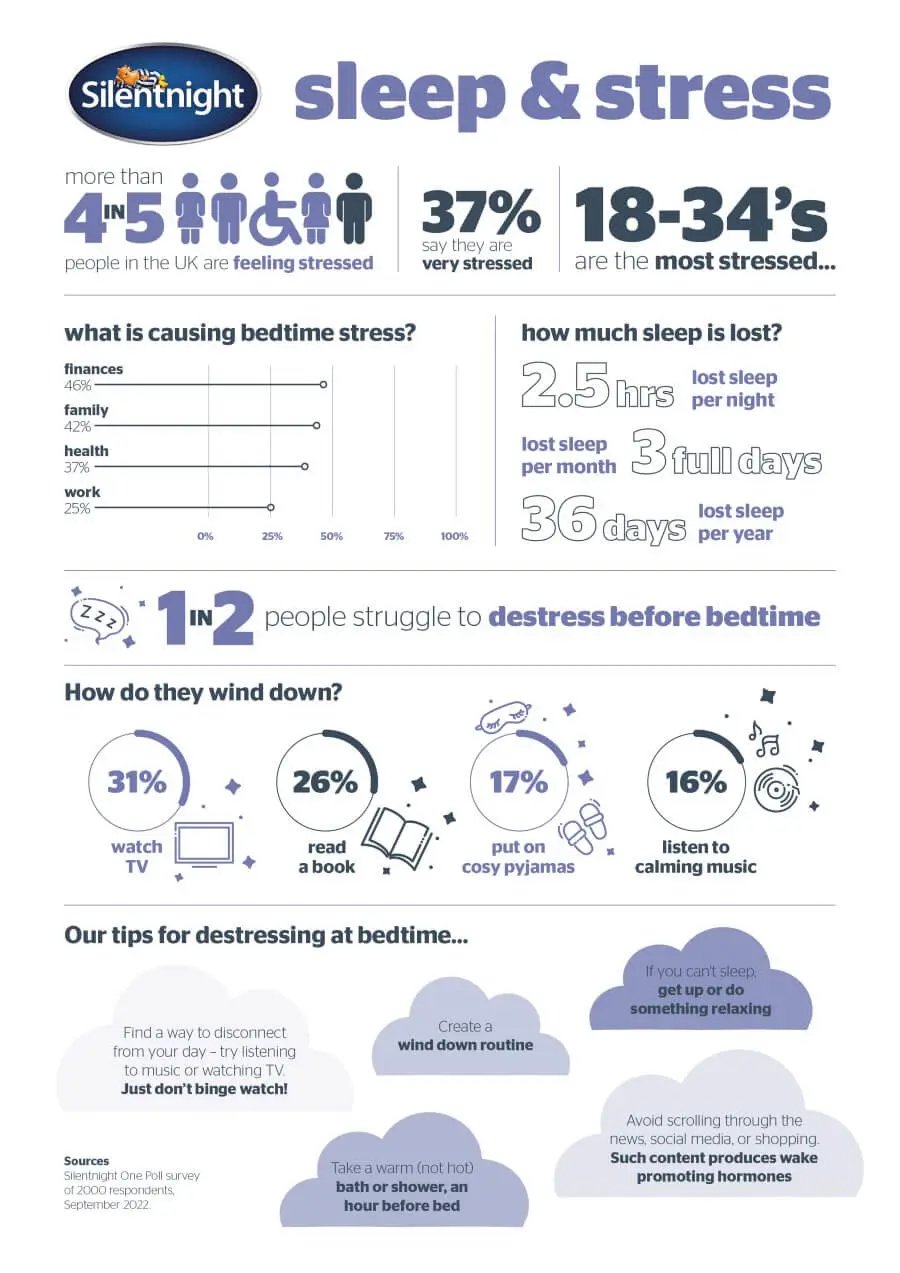
To reduce your anxiety for a better night’s sleep, you should make changes to your lifestyle. Regular exercise, breathing exercises, mindfulness, less alcohol intake, and making small but impactful choices like using sleep-inducing bath salts and listening to soothing music can all help calm your mind.
Sleep anxiety refers to the fear and stress about going to sleep and making sure you’re getting quality sleep.
High anxiety levels can disrupt your sleep routine, and getting lack of sleep can contribute to your anxiety so you’ll need to break the cycle for happier and healthier sleep habits.
Sleep is vital for your health, cognitive function and bodily repair. And they say around 7-9 hours of shut eye each night is recommended. But if you suffer from anxiety, you’ll know all too well just how difficult it can be to get the rest you need. When you’re feeling anxious, it’s hard to calm a racing mind and your worries always feel so much worse at night, alone or not in bed.
It’s no surprise that many people with anxiety disorders have trouble sleeping and as we always say, a lack of sleep has a negative impact on us in more ways than one. Our mood and concentration can be affected, and it can contribute to feeling irritable and depressed, all while potentially worsening our anxiety disorder. This inevitably leads to a negative cycle that could cause insomnia and other sleep disorders.
So, if anxiety is stopping you from sleeping and you can’t seem to switch off once your head hits the pillow, you’re in the right place. We’ve put together some tips and advice on how you can get a better night’s rest, even when anxious.
Anxiety is a feeling of worry and unease and it’s normal to feel like this during times of stress. With an anxiety disorder though, the distress becomes excessive, and these feelings can persist, interfering with everyday life in both a physical and emotional way.
You may feel extremely nervous, on-edge, have a fearful feeling or an impending sense of doom. In terms of the physical symptoms of anxiety, you’re likely to feel tense, rapid breathing and a fast heartbeat, and you may sweat, shake and feel fatigued.
Yes, you can experience anxiety attacks while sleeping: these are referred to as nocturnal panic attacks. Uncontrollably, these attacks will immediately wake you up and often manifest the same way as standard panic attacks. Usual symptoms include shortness of breath, intense dread and a racing heart.
On the other hand, lack of sleep amongst other lifestyle factors can also contribute to anxiety, increasing your risk of experiencing anxiety attacks. If you’re already prone to feeling anxious, sleep deprivation can worsen anxiety symptoms and leave you in a detrimental cycle of lack of sleep increasing your anxiety levels, which causes you to get less sleep.
Sleep anxiety is similar in that it’s a feeling of fear or stress about going to sleep. With sleep anxiety, you may feel apprehensive about not being able to sleep, and you may be worrying about not getting the quality sleep you need each night, making it feel impossible to drop off. Usually if you have a disorder like insomnia, restless leg syndrome, sleep apnea or narcolepsy, you’re more likely to develop sleep anxiety too.
When you’re feeling stressed and anxious, your body releases hormones that help you to react quickly in order to escape harm, and high levels of these hormones, especially at night, make it harder for your body to relax and therefore, it prevents you from falling asleep.

Without the distractions that happen throughout the day, it’s hard to refocus your mind on anything else other than your worries once you’ve gone to bed. This is the main reason why anxiety tends to get worse at night as when you’re focused on your concerns, you’ll feel more anxious and find it a challenge to fall asleep.
Yes, even when you’ve finally managed to drift off, it’s common to wake up during the night with that all too familiar feeling of anxiety and dread. Once awake, your mind can then start racing with worry once again and it will be difficult to fall back asleep. This leads to fragmented sleep and a lack of quality sleep too, so it’s no wonder you’ll feel irritable and sluggish the next day.
Anxiety also affects REM (rapid eye movement) sleep, which is the phase of sleep where you are most likely to experience vivid dreams. If you have anxiety, your dreams will likely become disturbing or turn into a nightmare that wakes you up.
Although trying to reduce your feelings of anxiety before going to bed is not always so easy, there are some things that you can do to help you sleep better. For instance, doing something that will relax you before bed and making it a part of your routine is a good way to help tackle anxiety. And building good sleep habits also makes going to bed a more positive and pleasant experience.
Here’s some more tips on how to beat anxiety so you can sleep better:
Exercising on a regular basis and eating a healthy diet can go a long way to reducing sleep anxiety, helping to break the cycle of worry and putting your mind at ease as you release more endorphins and take care of your internal self.
Breathing exercises are a simple yet effective way to create a sense of relaxation, and will help you to unwind and destress before going to bed.
Practicing mindfulness meditation promotes relaxation by focusing on the present, and it teaches you to slow down any racing thoughts. This type of meditation involves practises such as guided imagery and breathing techniques that’ll relax your body and reduce stress.
Listening to soothing sleep sounds like white noise, nature sounds, ocean waves and calming music will help with reducing anxiety, lowering blood pressure and slowing your heart rate, therefore helping you to relax and sleep better.
Essential oils for sleep and anxiety are a great relaxation aid and worth incorporating into your bedtime routine. Lavender, cedarwood, chamomile and peppermint help to promote calmness and alleviate anxiety, ensuring you feel relaxed for a quality kip.
Drinking alcohol in the evening affects the type of sleep you get and causes sleep disruptions too, so if you want a full undisturbed night’s rest, then make sure to avoid alcoholic beverages before going to bed.
Creating the right bedroom environment is an effective way to improve your sleep too. A space that’s cool, dark and quiet is your best bed, as well as making sure your mattress, pillows and bed is comfortable. You can also remove anything from the room that may disrupt your sleep, such as light-up cables or a ticking clock.
Even though we’ve mentioned breathing exercises and mindfulness, there’s some other relaxation techniques that may work in your favour when reducing your anxiety levels and focusing on quality sleep.
Progressive Muscle Relaxation
Tense each of your muscle groups for 5 seconds and then release. Repeat this at least 10 times.
Sleep-Focused Meditation
Practise by body scanning, visualising peaceful scenes and mindfulness
Moon Breathing
Often used in yoga, you breathe in through the right muscle and then back out through the left nostril.
Another solution to improving your anxiety disorder and sleep is Cognitive Behavioural Therapy (CBT), but how effective is this strategy up against the similar practise of mindfulness?
CBT: This is a structured psychotherapy which helps you to identify and challenge any negative thought patterns or behaviours. This can be hugely beneficial if you have anxiety as you begin to understand triggers and how to combat common thoughts like dread. It’s also been known to reduce disruptions during the night, and even out-perform medications designed to aid sleep long-term. The only downside is that it requires motivation and dedication, so you get the most out of the treatment.
mindfulness: This covers all things like meditation, awareness exercises and even breathing training. It’s recommended for reducing any intense thoughts, worries and emotional reactivity, so your emotions balance out and regulate. It's ideal for those suffering from insomnia while improving your sleep quality on a whole. However, it can take a while to feel its benefits, making it less instant than CBT.
There are many ways you can master a bedtime routine that improves your symptoms of anxiety. For instance, taking a warm bath before bed, listen to calming music while you lie down and write down any thoughts or worries to remove them from your mind. Check out our guide on perfecting a bedtime routine for better sleep for more tips.
Some of our recommendations include Headspace for guided meditations and other mindfulness resources, Calm for some great sleep stories and Better Sleep which has an array of relaxing sounds on offer to help you drift off into dreamland.
Which you opt for will depend on your exact needs and preferences. Valerian is known for having stronger sedative effects, so you can fall asleep and calm your anxiety quicker. However, it could cause grogginess, dizziness, vivid dreams and even an upset stomach.
On the other hand, chamomile is much milder and gentler on the digestive system. It supports relaxation and reduces wakeups during the night. And it even has minimal side effects.
Having a demanding job can intensify your anxiety levels even further, making falling and staying asleep that much more difficult. We recommend setting boundaries of when you’ll finish work and how much you’re realistically able to get done in a day, as well as schedule daily breaks and exercise. You should also be thinking about creating wind-down and sleep routines.
They’re similar to foods and drinks that aren’t recommended on a whole before bedtime, including things like caffeinated items, alcohol, carbonated drinks, spicy, heavy or fatty foods, sugary snacks and salty, processed or high protein goods.
If your sleep anxiety is keeping you awake due to its persistence or intensity, we recommend talking to your doctor or ringing a specialist helpline, such as CALM, who can assess your situation and give you the care you need.
If you enjoyed this read, discover our article on the risks of poor sleep health.